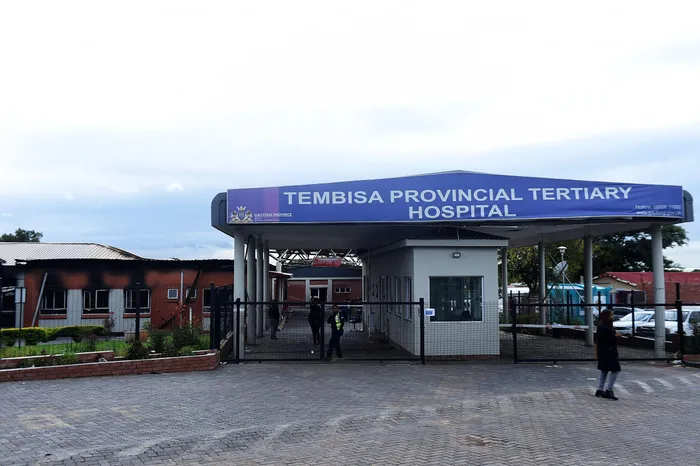How Tembisa Hospital's R2 billion scandal reveals deep-rooted corruption

The Department of Health has been accused of evading its responsibility of blacklisting companies that looted Tembisa Hospital after Minister Aaron Motsoaledi revealed that only the National Treasury can blacklist these service providers.
Image: Itumeleng English / Independent Newspapers
The Department of Health has been accused of dodging its responsibility to blacklist companies that looted more than R2 billion at the Tembisa Hospital because it has been captured by criminal syndicates and cartels at both national and provincial levels.
This comes after Health Minister Aaron Motsoaledi revealed that the department has requested the Special Investigating Unit (SIU) to initiate the process of blacklisting companies from doing business with the government.
The looting involved 207 service providers who traded with the hospital under 4,501 purchase orders that were found to be irregular.
Motsoaledi said that the SIU was submitting the names of the implicated service providers to the National Treasury for blacklisting, adding that only the National Treasury can blacklist companies from participating in government contracts.
Motsoaledi revealed this when he was responding to written questions from ActionSA MP Alan Beesley, who said the assertion that only the National Treasury is responsible for blacklisting is partly true, adding that this is a collective responsibility of the relevant accounting officers, such as the Tembisa Hospital CEO and the Gauteng Health head of department, the National Treasury, and the Presidency.
Governance expert and political analyst Sandile Swana said this shows that the “culture of blacklisting” does not exist in South Africa, adding that Motsoaledi, who is under pressure to take action, has to outsource it so that criminal syndicates and cartels do not blame him.
“This tells us that blacklisting is not part of the culture. That is why he will go and look for other people to come and introduce it for the first time. And it will be done from outside by the SIU, not the person who stipulated in the Public Finance Management Act (PFMA). The PFMA is unambiguous as to who must go and blacklist people; it is their accounting officer,” Swana said.
He said Motsoaledi has done this to avoid taking responsibility and blame from criminal syndicates and cartels, who might involve politicians.
Swana said that while the accounting officers also have the responsibility to inform the National Treasury about intentions to blacklist non-compliant companies, this must be accompanied by evidence.
Swana said the decision for Motsoaledi to request the SIU to take this responsibility also shows that he has no confidence in the CEO of the hospital and the director-general of the Health Department.
However, National Health spokesperson, Foster Mohale, insisted that only the National Treasury has the power to blacklist these service providers.
“In terms of the National Treasury guidelines, the blacklisting of companies involved in unethical business conduct could only be done through the National Treasury after the investigations have been conducted.
“After Babita Deokaran blew the whistle on widespread corruption and irregular payments in Tembisa Hospital, an investigation had to be conducted before the blacklisting of the companies. Thus, the Gauteng Department of Health has submitted the list of companies to be blacklisted to the Provincial Treasury for this purpose,” Mohale said.
The Gauteng Health and National Treasury could not respond at the time of publication.
Deokaran, who was assassinated in August 2021, had uncovered massive corruption related to fraud, corruption, and maladministration at the hospital and how the syndicates had devised devious means to avoid regulatory triggers.
Deokaran was the first to identify suspicious payments to over 200 companies, totalling around R850 million at Tembisa Hospital. However, the amounts identified by the SIU investigation now exceed R2bn.
The SIU investigation found that the syndicates had bypassed tender processes, falsified documents, and overpriced items. The investigation also identified that the syndicates kept the value of purchase orders below R500,000, which is the threshold for formal tenders. This enabled them to use a less-stringent three-quote system for procurement, which was easier to manipulate.
The SIU found that this was intentionally abused to circumvent the tender process and to keep the authorisation level as low as possible.
It also found that suppliers were not sourced from the central supplier database (CSD) and the required commodity list. Instead of using the official CSD, the hospital allegedly used a non-compliant process that included no evidence of fair rotation among service providers, suggesting potential collusion or fronting. The SIU also identified significant non-compliance with procurement terms.
The Public Servants Association (PSA), on the other side, said the failure to blacklist the implicated companies represents a shocking lapse in accountability and governance that continues to erode public trust in the government's ability to safeguard taxpayers' funds.
The association added that it is unacceptable that bureaucratic loopholes and finger-pointing between the Health Department and the National Treasury have allowed this scandal to drag on without decisive action.
“While the Minister of Health claims that only the Treasury can blacklist suppliers, this excuse does not protect funds or prevent repeat offenders from further looting State coffers.”
Professor Andre Duvenhage, a political analyst from the North-West University, said while it is good that the department is taking action against the implicated companies, the NPA and other relevant institutions within the criminal justice system should have been involved at an early stage, taking into consideration that the murder of Deokaran had already taken place.
Duvenhage said it was concerning that Deokaran’s indication about these activities lacked political will to act.
“This also shows that there is a lack of effective and efficient control. It also says that the BEE policy is riddled with corruption or is serving as an instrument that may promote corrupt deals, and there is a lack of political oversight and related actions in this regard,” he said, adding that the National Treasury could have also been involved in the beginning.
manyane.manyane@inl.co.za